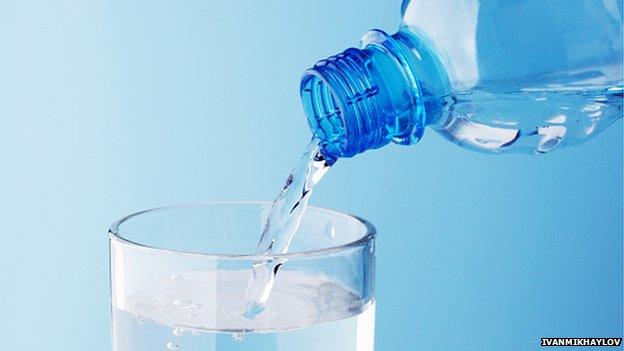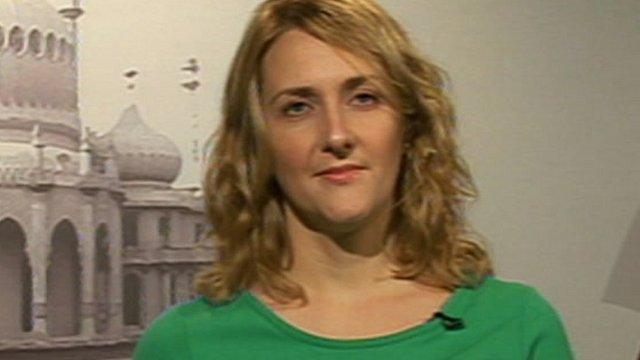Are women with severe pregnancy sickness being failed?
- Published

There are varying degrees of severe pregnancy sickness and the worst cases are confined to bed
It is estimated that 10,000 women every year are affected by extreme nausea and vomiting during their pregnancies, also known as hyperemesis gravidarum (HG), which is much more severe than the morning sickness experienced by one in three pregnant women.
One of those with HG is the Duchess of Cambridge, who is soon to give birth to her second child.
Her pregnancies have helped to raise awareness of the debilitating condition - which can leave women too ill to get out of bed and vomiting 30 times a day - but for 10% of sufferers, the symptoms are simply intolerable.
They feel they have no choice but to terminate their pregnancies.
According to charity Pregnancy Sickness Support, which has produced a report on women's experiences of hyperemesis gravidarum, entitled 'I could not survive another day', external, too many women don't receive the care and treatment they need to continue their pregnancies.
The report surveyed 70 women from the UK who had chosen to end their pregnancy in the last 10 years because of severe sickness.
'Really grim'
Their experiences suggest that in some cases GPs and midwives are not willing to provide medication to treat the condition or are slow to recognise its severity.
Lily - not her real name - knows how it feels to be seriously ill with HG.
Her first pregnancy was "really grim, but I battled through it", she says.
She was bed-ridden for the first few months, only able to drink a little and was being sick up to 30 times a day. She became dehydrated and starving, eventually losing three stones (19kg) in weight.

Many women with severe sickness during pregnancy end up taking a lot of time off work
"I was really weak and couldn't stand up from dizziness. I couldn't handle food smells, even the smell of my husband made me vomit.
"I remember forcing down some beans one day, but within seconds they came back up."
Lily's GP came to visit her now and then and prescribed a drug to stop her being sick - but it didn't stop the extreme nausea.
Eventually, after 22 weeks of pregnancy, her HG began to wear off to the extent that she only threw up once a day.
She gave birth to a daughter in 2011.
'Begging for steroids'
But when she became pregnant again just a few months later, she couldn't even sip water without being sick.
She was very ill and, with a baby to look after at home, just could not cope.
"I was begging the doctors for steroids [which can be an option for women who don't respond to other anti-sickness drugs] but we had moved house so no-one came to test my urine and I wasn't admitted to hospital for fluids."
The report found women are sometimes told that steroids can harm the foetus or that they are too expensive to prescribe.
Fewer than one in 10 were offered steroid therapy and 47% of the women surveyed said they had asked for medication and it had been refused, or were not offered any.
Caitlin Dean, chair of Pregnancy Sickness Support, says many women are under the illusion or advised by their healthcare professionals that there are no safe treatments that can be used in pregnancy.

Even sipping water can make some women with severe hyperemesis gravidarum very sick
"But there is a range of medications all known to be safe and effective which have been around for more than 50 years.
"And there is plenty of evidence they are not causing any concerns."
Dr Daghni Rajasingam, consultant obstetrician from St Thomas' Hospital in London and a spokeswoman for the Royal College of Obstetricians and Gynaecologists, said HG was well understood and should be taken very seriously.
"We can start by giving women tablets to help the sickness, bring them into hospital to receive intravenous fluids and nutrition if necessary and give steroids in very severe cases."
An increase in public awareness of HG could make GPs and midwives more sympathetic towards patients who have severe pregnancy sickness, she adds.
"We have to ensure when women are pregnant they have a contact to discuss these issues with."
No choice
Lily gave up trying to get help during her second pregnancy because she was too busy just trying to survive one day at a time.
In the end, she didn't feel as if she had a choice.
"With all those motherly instincts you have, to terminate a child's life you've got to be desperate.
"I really felt as if I was on my last legs," she recalls.
Lily says she won't have another baby now, in fact she fears getting pregnant again.
"I don't trust the doctors. They don't take it seriously enough and it would just lead to another termination."
Caitlin Dean went through three pregnancies with HG, but thanks to an understanding GP and good care before and after conception, the third pregnancy was much more bearable.
She wants to see improved care for every woman with HG and she believes the key to reducing terminations is to provide a service which gives women intravenous fluids at home to combat dehydration.
It would be much more cost-effective than admitting women to hospital each time, she argues.
- Published8 September 2014

- Published8 September 2014

- Published4 December 2012

- Published4 December 2012
